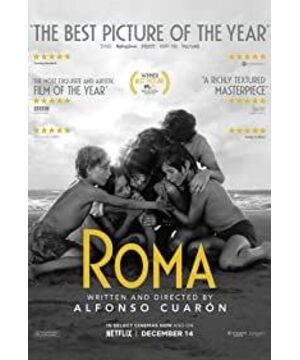In the Roman community of Mexico City, the maid Clio was abandoned unexpectedly and gave birth to a stillborn baby, and the hostess Sophie also left her husband who did not love him. Alfonso Cuaron, who has achieved some success in Hollywood, made an author's film, recalling a time in his childhood, in memory of his mother and maid. The movie is very interesting, but I personally don't like it. This is a work that is too literary. Extracting all aspects of its information is an expression of symbolic meaning, and it can even be easily imagined as an expression of words. The foamy water washed the floor tiles over and over again, a small square patio was reflected in the water, and a plane flew slowly across the sky. This is the beginning of the movie. Behind the screen, the maid Cleo is washing the traces of shit on the floor tiles. In the first picture, we only know that she is cleaning the floor tiles. As the plot unfolded, we learned that those shits always appeared more and more on the floor tiles deliberately, just thinking about the unsatisfactory things in her life. This is a symbol I don't like very much in this movie, because of the details of the shit, the hostess vents some of the depression that her husband is snubbing her, that's okay, but putting shit in the yard like this is really bad So boring magic. Would anyone leave so much uncleaned? Or can this dog complete the formation in one night? You can call life shit, but such a straightforward analogy is really not advanced. The poor Clio, the Clio who accompanied the bubble, and the Clio who opened the door with the dog repeatedly. There are many details about the life of young maids in the film, and some specially designed scenes for the status and situation of maids, I once thought that this film might be about the life of the poor. It turned out to be a film about women. This is evident in the appearance and exit of the male host. This somewhat authoritative male character appears to the music on the radio and exits during the performance of a street drum band. Such a sense of ritual obviously emphasizes that he once existed in the life of the hostess. Therefore, the kind-hearted maid, the abandoned maid, and the equally lonely hostess have some connotations of sympathy. The director is very honest. He didn't just talk about how well the hostess took care of the maids. Instead, he brought out a lot of white people's occupation of the local people's land. They stuffed the dogs that lived on the estate. They shot in the forest for the stuffed deer in the house. They brought fire to the forest, and the land had the same earthy taste as Maid Cleo's hometown. The plane is the most common symbol in the film, representing the world outside the life of the characters in the film. The plane reflected in the cleaning of the floor tiles. The youngest kid raved about being a fighter pilot in a previous life when the maid was there around. When the floor tiles were cleaned for the second time, the sound of the plane in the next theater entered early. The maid told her boyfriend that she was pregnant, but the plane in the movie was crashing. A hilarious professor instructing a group of locals practising martial arts, the plane flies slowly behind him. And after all the dust settles, this family living together grows up and returns to their original life, and the plane still slowly passes over the yard. In addition, there are so many different symbols in the movie, and there are too many to play with, it is really unnecessary. I agree with the core of the story, and I agree with a lot of long shots that the director seems to hide himself behind the camera, but I really don’t like so many symbolisms, it’s very contrived. It seems that the audience who watched this movie were forced to interpret his many narcissistic little designs.
View more about Roma reviews











